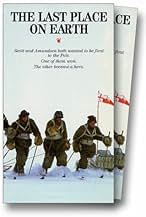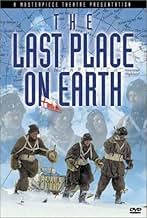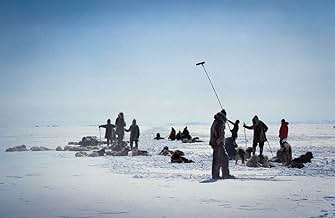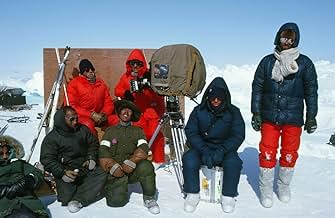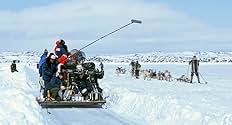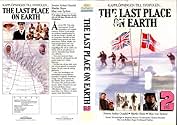Una exploración de la rivalidad entre el capitán Robert F. Scott y Ronald Amundsen en su intento de alcanzar el Polo Sur.Una exploración de la rivalidad entre el capitán Robert F. Scott y Ronald Amundsen en su intento de alcanzar el Polo Sur.Una exploración de la rivalidad entre el capitán Robert F. Scott y Ronald Amundsen en su intento de alcanzar el Polo Sur.
Explorar episodios
Opiniones destacadas
This is a fabulous mini-series - a docudrama - about the South Pole expeditions of Norwegian R Amundsen and the British Robert Falcon Scott. The acting and photography are superb, an excellent period piece (although the quality of the DVD itself is a bit grainy).
Unless you've slept under a rock for 100 years, or never read a history book, you know that Amundsen reached the Pole first, and successfully returned, whereas Scott and 4 of his men perished miserably on the return trip. Why? It's all about project management. This DVD is all about properly managing a complicated project dealing with the wilds of nature. Amundsen has 'it' - Scott doesn't.
The Norwegians are highly-skilled at traveling in frozen wastelands. They are in fine physical condition, they know how to ski and handle dog-teams. Amundsen recruits a small team of specialists. He doesn't get too high or low about anything, nor does he get too close to the team--he remains aloof. He makes meticulous preparations.
The British are operated like a Navy Ship under military command: Scott gives orders and doesn't want them questioned. He has a group of favorites, but takes a colossal team of guys, mostly military, but some civilians, who find Scott pompous, arrogant and misguided. He breaks promises and plays the men against each other, while they hope to be in the final group to make the final trek. He sends the wrong guy to purchase Siberian ponies, to save a few bucks, plus he fails to include a couple of key players, including a properly-trained team to tend to the motor sledges. Since there wasn't a Walmart Auto (or Canadian Tire) in the Antarctic, you might wonder what he was thinking. But his biggest problem is the notion of man-hauling the enormous loads all the way to the Pole. you see: no one walks when they can ride. and the Eskimos always rode dog-teams. Scott had experienced some difficulties with dogs in the past, but that's no excuse.
I might direct your attention to a couple of fabulous scenes featuring Bill Nighy, who plays Meares, one of the dog-team drivers. Meares says he'd rather swim back to New Zealand than spend another season under Scott's command. He later tells Scott, in so many words, that he finds it highly unlikely that Scott will live to criticize Meares' choices. Nighy is terrific.
In case you missed it, this screenplay is based on a historical non-fiction piece created after it was discovered that many unflattering portions of Scott's diary were excised from the publication released to the public. There has been quite the resistance from many quarters to a revised viewpoint of a man considered to be a great British hero. Apparently, some recent discovery that the weather was particularly cold when Scott tried to return from the Pole is cited as startling scientific evidence that this presentation of Scott as a peevish incompetent should be set aside. well, whose decision was it to try walking there and back anyway? As Meares says (in this dramatization): 'any man who sits in the Antarctic and whines about the weather is unfit to lead'.
I'll close with a quote, not from this film, but from the 1948 'Scott of the Antarctic' with John Mills. The Scott character (Mills) tells Nansen (the elder statesman of Arctic exploration) that he is going to the South Pole with motor sledges, Siberian ponies, and dogs. Nansen replies that Scott should take dogs, dogs and more dogs.
Amundsen did - Scott didn't. Case closed.
Enjoy this excellent re-creation of events. It's insightful.
Unless you've slept under a rock for 100 years, or never read a history book, you know that Amundsen reached the Pole first, and successfully returned, whereas Scott and 4 of his men perished miserably on the return trip. Why? It's all about project management. This DVD is all about properly managing a complicated project dealing with the wilds of nature. Amundsen has 'it' - Scott doesn't.
The Norwegians are highly-skilled at traveling in frozen wastelands. They are in fine physical condition, they know how to ski and handle dog-teams. Amundsen recruits a small team of specialists. He doesn't get too high or low about anything, nor does he get too close to the team--he remains aloof. He makes meticulous preparations.
The British are operated like a Navy Ship under military command: Scott gives orders and doesn't want them questioned. He has a group of favorites, but takes a colossal team of guys, mostly military, but some civilians, who find Scott pompous, arrogant and misguided. He breaks promises and plays the men against each other, while they hope to be in the final group to make the final trek. He sends the wrong guy to purchase Siberian ponies, to save a few bucks, plus he fails to include a couple of key players, including a properly-trained team to tend to the motor sledges. Since there wasn't a Walmart Auto (or Canadian Tire) in the Antarctic, you might wonder what he was thinking. But his biggest problem is the notion of man-hauling the enormous loads all the way to the Pole. you see: no one walks when they can ride. and the Eskimos always rode dog-teams. Scott had experienced some difficulties with dogs in the past, but that's no excuse.
I might direct your attention to a couple of fabulous scenes featuring Bill Nighy, who plays Meares, one of the dog-team drivers. Meares says he'd rather swim back to New Zealand than spend another season under Scott's command. He later tells Scott, in so many words, that he finds it highly unlikely that Scott will live to criticize Meares' choices. Nighy is terrific.
In case you missed it, this screenplay is based on a historical non-fiction piece created after it was discovered that many unflattering portions of Scott's diary were excised from the publication released to the public. There has been quite the resistance from many quarters to a revised viewpoint of a man considered to be a great British hero. Apparently, some recent discovery that the weather was particularly cold when Scott tried to return from the Pole is cited as startling scientific evidence that this presentation of Scott as a peevish incompetent should be set aside. well, whose decision was it to try walking there and back anyway? As Meares says (in this dramatization): 'any man who sits in the Antarctic and whines about the weather is unfit to lead'.
I'll close with a quote, not from this film, but from the 1948 'Scott of the Antarctic' with John Mills. The Scott character (Mills) tells Nansen (the elder statesman of Arctic exploration) that he is going to the South Pole with motor sledges, Siberian ponies, and dogs. Nansen replies that Scott should take dogs, dogs and more dogs.
Amundsen did - Scott didn't. Case closed.
Enjoy this excellent re-creation of events. It's insightful.
Let me start out by agreeing with everyone who has previously written: it is the best drama about polar adventure ever made.
The viewer should be very skeptical about the Scott defenders because it is evident their homework is shallowly researched and based on a very limited interpretation of Scott's polar problem: that bad luck and bad weather caused his downfall.
I've read Huntford's book 3 times, read the weather article and seen the PBS episode where the young scientist tried to resurrect Scott as a noble, if unfortunate hero. Also, Huntford and his fellow professionals have posted excellent rebuttals regarding these spurious claims about Scott and the weather.
The questions that should put an end to the argument is this: who would get you through safely and who exhibited a breadth of polar knowledge sufficient to AVOID the problems of travel in the brutal Antarctic?
If you said Scott, then you probably thought the Charge of the Light Brigade was a wonderful jaunt through Russian cannon fire just to show how noble and brave you were. Above all else, don't let these half-informed reviewers go without a serious look into the counter-points made to their weak arguments.
Still, the series is a breath-taking look at the human struggle to survive and to seek glory and the dreadful price it takes in lives and in the judgment of history.
The viewer should be very skeptical about the Scott defenders because it is evident their homework is shallowly researched and based on a very limited interpretation of Scott's polar problem: that bad luck and bad weather caused his downfall.
I've read Huntford's book 3 times, read the weather article and seen the PBS episode where the young scientist tried to resurrect Scott as a noble, if unfortunate hero. Also, Huntford and his fellow professionals have posted excellent rebuttals regarding these spurious claims about Scott and the weather.
The questions that should put an end to the argument is this: who would get you through safely and who exhibited a breadth of polar knowledge sufficient to AVOID the problems of travel in the brutal Antarctic?
If you said Scott, then you probably thought the Charge of the Light Brigade was a wonderful jaunt through Russian cannon fire just to show how noble and brave you were. Above all else, don't let these half-informed reviewers go without a serious look into the counter-points made to their weak arguments.
Still, the series is a breath-taking look at the human struggle to survive and to seek glory and the dreadful price it takes in lives and in the judgment of history.
10Rosabel
This series was a great revelation to me: I'd heard of "Scott of the Antarctic" but never of Roald Amundsen, the man who beat Scott to the South Pole. It is a fine adaptation of the book by Roland Huntford, and does a great job of poking a hole in the romantic illusion that this adventure was some landmark episode of English heroism. It is instead an illustration of a truth that no one at the time could admit: that by 1912 "Britain was forgetting how to think", and too long a period at the top as the world's pre-eminent power had bred arrogance, inflexibility and an inability to learn. The contrast between the pompous incompetence of the British and the intelligence and adaptability of the underdog Norwegians is highlighted throughout the series. As Amundsen says in the first episode, "Experience teaches them only one thing: that they are British, and therefore pre-eminent. But Nature is deaf to such things; she cannot hear the tunes of glory." Even to a person who does not already know the historical outcome of this story, the British from the beginning seem to be marching to their doom. The whole expedition, despite the money and materiel lavished upon it, is a story of shoddiness, second-rate decision-making, and slovenly improvisation. The blame for most of this is laid squarely upon Scott himself, who is shown as a thoroughly mediocre leader. Martin Shaw gives a wonderful performance as Scott, and even manages the considerable feat of creating some sympathy for this stupid man, pushed out of his depth and driven by ambition to attempt something he is incapable of achieving. There was some outrage, especially in Britain, both at the book and the series, which were seen as unfairly kicking Scott, who had at least paid with his life for any mistakes he might have made. The makers of this series are to be complimented for not yielding to such sentimentality. They never let us forget that 4 other men died with Scott as a result of his stupidity, and the horror of their slow death by starvation, scurvy, exposure and infection is presented unflinchingly. The end of the series gives us a cynical scene with Scott's widow and the responsible officers of the Admiralty busy concocting the myth of "Scott of the Antarctic" which was to beguile the public until Huntford's book came along to shine the light of truth into this corner of history. Hopefully, as a result of the book and the series, there can be no going back to the comfortable lies of the past.
Roland Huntford's definitive saga of polar exploration, "Scott and Amundsen", is brought very faithfully to film in this 7-episode BBC series. Huntford was the former Scandinavian correspondent for London's "Observer", and his book was the first to debunk Scott's supposed heroic martyrdom.
Beautiful cinematography and several very solid performances by Sverre Anker Ousdal as the introspective and driven Amundsen; Martin Shaw nails the effete martinet, Scott; Michael Maloney is great as Scott's betrayed 2nd Officer, Teddy Evans; Toralv Maurstad as the outspoken Norwegian polar veteran, Hjalmer Johanssen; and, Richard Morant as, W.E.G. Oates, the army officer in a Navy environment and apparently the only man in Scott's party capable of independent thought.
Beautiful cinematography and several very solid performances by Sverre Anker Ousdal as the introspective and driven Amundsen; Martin Shaw nails the effete martinet, Scott; Michael Maloney is great as Scott's betrayed 2nd Officer, Teddy Evans; Toralv Maurstad as the outspoken Norwegian polar veteran, Hjalmer Johanssen; and, Richard Morant as, W.E.G. Oates, the army officer in a Navy environment and apparently the only man in Scott's party capable of independent thought.
I have spent 45 years or more reading Arctic and Antarctic histories and I'm famiiar with most of the important written works on these subjects. I believe it's generally unfair to compare the Amundsen and Scott expeditions of 1911-12. Amundsen set one objective: to be the first to reach the south geographuc pole. This too was A Scott's objective but he other goals too. Scott didn't go south with the expectation of being in a race to the South Pole but arriving in Melbourne he found himself in just such a race. It was a race that he unfortunately could never win. This film explains why.
I don't like denigrating a supremely brave man, even if Scott was arrogrant, over-confident, not an effective leader, and poorly organized owing to the former attributes. Scott's Royal Navy career was prematurely curtailed when Sir Jackie Fisher, First Sea Lord, held him responsible for a ship's collision. Fisher told Scott that he would receive no further promotions and that was that. Early in his naval career, Scottw was befriended by Sir Clement Markham, head of the Royal Geographic Society, and Markham encouraged Scott to apply to lead what would become known as the 'Discovery Expedition'. Markham didn't like Sir Ernest Shackleton, especially after the latter nearly died on Scott's trip south in 1901-02, and therefore never seriously backed Sir Ernest's Antarctic efforts. Scott, with Markham's full support, undertook the 'Terra Nova Expedition: Markham, in effect, determined who received RGS backing and who gained government support. Without Markham's backing Scott likely never would have had a second expedition. Scott's competence, or lack there of, was never really at issue: Markham was Scott's great enabler.
Scott by temperment and training was not an explorer. He began exploring after his chosen career in the RN was prematurely ended. Amundsen was a professional explorer, inspired by Nansen's trek across Greenland in the 1880s and the subsequent 'Fram Drift' in the Arctic in the early 1890s. Amundsen became an excellent Nordic skier in hus teens and he began his exploring career with the Belgian Antarctic Expedition in the late 1890s, where he spent a year ice bound off the Antarctic Peninsular (he met Dr. Fredrick Cook at this time). A few years later, Amundsen led an expedition to locate the North Geomagnetic Pole. He successful mastered the science needed to do this, spending .3 years in the Canadian Arctic. At this time, Amundsen learned Arctic survival from the Inuit and in 3 years his men never suffered the physical deprevations so common to other Arctic explorers. He helped solve the riddle of the Sir John Franklin expedition on the 1840s, traversed the Northwest Passage, and then forced to winter at Herschel near the MacKenzie River Delta. He undertook a 1200 mile round trip on skis over the Brooks Range to telegram his backers of his discoveries. My point: Amendsen was not an amateur explorer, it was his profession.
Huntford's facts speak for themselves and no recent resesrch can reasinably deny them. Scott was a brave man but then so was Amundsen. Amundsen was a natural self-promoter with a huge ego but these aren't relevant to the man's competence. Scott simply wasn't in Amundsen's league as an explorer. Scott wasn't in the same league as Sir Ernest Shackleton or Sir Douglas Mawson. Scott was out of his depth, too proud to see it, and he led his men into catastrophe. This very nearly happened to Sir Ernest 3 years later. Shackleton was however, a great and inspirational leader so when disaster hit, he led his men to safety against all odds. Anyone interested in an account of just part of Shackleton's Transantarctic Expedition 1914-17 might read F.A.. Worselley's 'Shackleton's Boat Journey'. Another incredible story of Antarctic survival is 'Mawson's Will' concerning Sir Douglas's recovery from near disaster in Adelie Land in the late teens.
Scott and his mean didn't have to die horribly. It occurred because Scott made poor decisions as a leader, refused the sound of advice of experts when given, and he entrusted his future and that of his men to luck and the well known British Imperial spirit. Sadly, he ran out of luck, and in Antarctica no amount of indominability can overcome nature. I really don't believe that Scott fully appreciated the risks he took. Oh, he knew there were ricks but he honestly believed his wil (and some luck!), could overcome any obstacle he faced. He gambled and he lost. Amundsen fully understood polar life and he did everything possible to minimize risk. He didn't rely on luck or pluck but sound planning and preparation. He chose his men well, he bet his financial future on this expedition, survived, and won his bet. Amundsen's men gained weight on their trip to the pole and back. This movie explains what occurred and offers a glimpse why. Amundsen went on to sail though the Northeast Passage (second man to do it), and in the late 1920s, helping to search for the Italia Expedition of Nobile', Amundsen dies in the Arctic.
I don't like denigrating a supremely brave man, even if Scott was arrogrant, over-confident, not an effective leader, and poorly organized owing to the former attributes. Scott's Royal Navy career was prematurely curtailed when Sir Jackie Fisher, First Sea Lord, held him responsible for a ship's collision. Fisher told Scott that he would receive no further promotions and that was that. Early in his naval career, Scottw was befriended by Sir Clement Markham, head of the Royal Geographic Society, and Markham encouraged Scott to apply to lead what would become known as the 'Discovery Expedition'. Markham didn't like Sir Ernest Shackleton, especially after the latter nearly died on Scott's trip south in 1901-02, and therefore never seriously backed Sir Ernest's Antarctic efforts. Scott, with Markham's full support, undertook the 'Terra Nova Expedition: Markham, in effect, determined who received RGS backing and who gained government support. Without Markham's backing Scott likely never would have had a second expedition. Scott's competence, or lack there of, was never really at issue: Markham was Scott's great enabler.
Scott by temperment and training was not an explorer. He began exploring after his chosen career in the RN was prematurely ended. Amundsen was a professional explorer, inspired by Nansen's trek across Greenland in the 1880s and the subsequent 'Fram Drift' in the Arctic in the early 1890s. Amundsen became an excellent Nordic skier in hus teens and he began his exploring career with the Belgian Antarctic Expedition in the late 1890s, where he spent a year ice bound off the Antarctic Peninsular (he met Dr. Fredrick Cook at this time). A few years later, Amundsen led an expedition to locate the North Geomagnetic Pole. He successful mastered the science needed to do this, spending .3 years in the Canadian Arctic. At this time, Amundsen learned Arctic survival from the Inuit and in 3 years his men never suffered the physical deprevations so common to other Arctic explorers. He helped solve the riddle of the Sir John Franklin expedition on the 1840s, traversed the Northwest Passage, and then forced to winter at Herschel near the MacKenzie River Delta. He undertook a 1200 mile round trip on skis over the Brooks Range to telegram his backers of his discoveries. My point: Amendsen was not an amateur explorer, it was his profession.
Huntford's facts speak for themselves and no recent resesrch can reasinably deny them. Scott was a brave man but then so was Amundsen. Amundsen was a natural self-promoter with a huge ego but these aren't relevant to the man's competence. Scott simply wasn't in Amundsen's league as an explorer. Scott wasn't in the same league as Sir Ernest Shackleton or Sir Douglas Mawson. Scott was out of his depth, too proud to see it, and he led his men into catastrophe. This very nearly happened to Sir Ernest 3 years later. Shackleton was however, a great and inspirational leader so when disaster hit, he led his men to safety against all odds. Anyone interested in an account of just part of Shackleton's Transantarctic Expedition 1914-17 might read F.A.. Worselley's 'Shackleton's Boat Journey'. Another incredible story of Antarctic survival is 'Mawson's Will' concerning Sir Douglas's recovery from near disaster in Adelie Land in the late teens.
Scott and his mean didn't have to die horribly. It occurred because Scott made poor decisions as a leader, refused the sound of advice of experts when given, and he entrusted his future and that of his men to luck and the well known British Imperial spirit. Sadly, he ran out of luck, and in Antarctica no amount of indominability can overcome nature. I really don't believe that Scott fully appreciated the risks he took. Oh, he knew there were ricks but he honestly believed his wil (and some luck!), could overcome any obstacle he faced. He gambled and he lost. Amundsen fully understood polar life and he did everything possible to minimize risk. He didn't rely on luck or pluck but sound planning and preparation. He chose his men well, he bet his financial future on this expedition, survived, and won his bet. Amundsen's men gained weight on their trip to the pole and back. This movie explains what occurred and offers a glimpse why. Amundsen went on to sail though the Northeast Passage (second man to do it), and in the late 1920s, helping to search for the Italia Expedition of Nobile', Amundsen dies in the Arctic.
¿Sabías que…?
- TriviaDirector Ferdinand Fairfax had previously worked with Martin Shaw on the TV series The Professionals (1977-81). Whilst he was unimpressed with Lewis Collins ego on that show, he was impressed by Shaw's acting range and desire to be offered more challenging material. So when he was asked to direct this miniseries he successfully lobbied the producers (who were considering Timothy Dalton among others) to meet Shaw. They too liked him and he was eventually offered the lead role.
- ErroresOn his return from the South Pole at 'Framheim,' Amundsen learns that the credit for reaching the North Pole has been taken away from Dr Frederick Cook and given instead to Peary. In reality, Amundsen was well aware of the controversy *before* his departure for Antarctica, and to avoid any question that he had not reached the true South Pole due to faulty navigation, staked out an area of ten miles around what he believed to be the Pole itself.
Selecciones populares
Inicia sesión para calificar y agrega a la lista de videos para obtener recomendaciones personalizadas
- How many seasons does The Last Place on Earth have?Con tecnología de Alexa
Detalles
Contribuir a esta página
Sugiere una edición o agrega el contenido que falta

Principales brechas de datos
By what name was The Last Place on Earth (1985) officially released in India in English?
Responda
